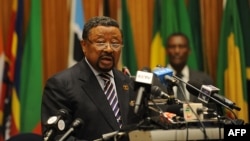ADDIS ABABA — An African Union summit opened in Addis Ababa Sunday with calls for the AU to play a more active role in settling regional conflicts. The AU plans to support military interventions in the eastern Democratic Republic of Congo and Mali.
African Union Commission chairman Jean Ping opened the summit with a call for African solutions to African problems.
“Indeed the solutions to African problems are found on the continent and nowhere else,” he said. “Coherent leadership is needed to carry out African initiatives, and it is important for all to join together to give concrete form to our vision.”
While the theme of the 19th annual AU summit is promoting intra-African trade, security issues have so far dominated much of the discussions.
During his opening remarks, Ping said the AU may contribute to a regional force in the Democratic Republic of Congo to confront armed groups. Rebel soldiers, known as M23, have been battling the Congolese army in eastern Congo since April.
On Saturday, the AU Peace and Security Council affirmed its support for West African nations to prepare a military intervention in northern Mali, where Islamist militants have seized control of several towns in the wake of a political rebellion.
There have been signs of progress in AU-mediated talks between Sudan and South Sudan. The leaders of both countries met for a closed door meeting late Saturday ahead of the summit.
The two countries resumed negotiations this week to settle the disputes left unresolved following their separation last year.
Meantime, all eyes are watching a close election contest for the next chairperson of the AU Commission.
Incumbent chairman Ping is competing against South African Home Affairs Minister Nkosazana Dlamini-Zuma.
The candidates ran against each other at the last summit in January, but neither won enough votes to win the post, and Ping retained the chairmanship.
Dlamini-Zuma has maintained strong support from southern members, while Ping, from Gabon, enjoys support from the west.
Speaking to reporters Sunday, Dlamini-Zuma denied the vote was pitting the regions against each other.
“I don't think any election should be seen as divisive, because after the election whoever wins here today, we should all support,” said Dlamini-Zuma.
Analysts say the vote is likely to result in a similar outcome to January, and another stalemate is a strong possibility.
African Union Commission chairman Jean Ping opened the summit with a call for African solutions to African problems.
“Indeed the solutions to African problems are found on the continent and nowhere else,” he said. “Coherent leadership is needed to carry out African initiatives, and it is important for all to join together to give concrete form to our vision.”
While the theme of the 19th annual AU summit is promoting intra-African trade, security issues have so far dominated much of the discussions.
During his opening remarks, Ping said the AU may contribute to a regional force in the Democratic Republic of Congo to confront armed groups. Rebel soldiers, known as M23, have been battling the Congolese army in eastern Congo since April.
On Saturday, the AU Peace and Security Council affirmed its support for West African nations to prepare a military intervention in northern Mali, where Islamist militants have seized control of several towns in the wake of a political rebellion.
There have been signs of progress in AU-mediated talks between Sudan and South Sudan. The leaders of both countries met for a closed door meeting late Saturday ahead of the summit.
The two countries resumed negotiations this week to settle the disputes left unresolved following their separation last year.
Meantime, all eyes are watching a close election contest for the next chairperson of the AU Commission.
Incumbent chairman Ping is competing against South African Home Affairs Minister Nkosazana Dlamini-Zuma.
The candidates ran against each other at the last summit in January, but neither won enough votes to win the post, and Ping retained the chairmanship.
Dlamini-Zuma has maintained strong support from southern members, while Ping, from Gabon, enjoys support from the west.
Speaking to reporters Sunday, Dlamini-Zuma denied the vote was pitting the regions against each other.
“I don't think any election should be seen as divisive, because after the election whoever wins here today, we should all support,” said Dlamini-Zuma.
Analysts say the vote is likely to result in a similar outcome to January, and another stalemate is a strong possibility.











